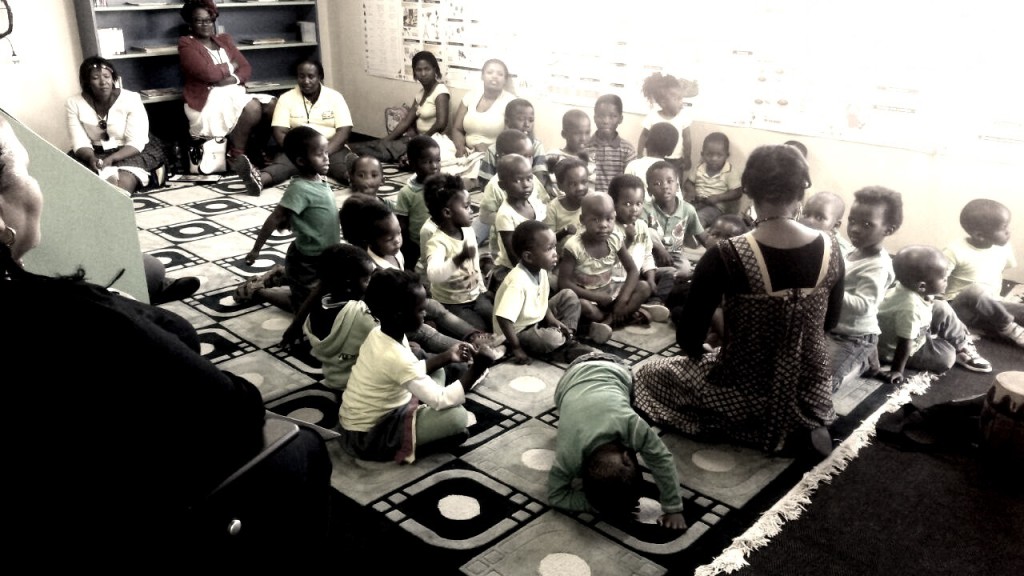"Once upon a time, there was a very clever young man in a certain village. People were jealous about this. One day an old man came to visit this young clever man to ask him some difficult questions to prove his intelligence..."
This Heritage Day, we asked our team and children who attend Nal’ibali reading clubs to record some of the old stories their families like to share. What followed was tale after tale of traditional stories told to them by their grandparents – brimming with life lessons and humour. These tales are often the first glimpses that many children experience into the world of reading and stories. And they’re powerful, not simply because they’re exciting and imaginative, but because they set the foundation for how children come to experience and narrate their own lives.
Studies have shown that reading fiction and understanding fictional characters improves children’s ability to develop empathy – the results of which last long into their adulthood. But a growing body of research also reveals that sharing family stories has benefits for children too. And in a country where oral storytelling is part of our roots, what better way to help empower our children and young people.
Stories: Our Heritage
Storytelling itself is, and always has been, a part of African culture. Regardless of the way stories are told, or what medium is used to express them – whether it’s songs, books or plays – they are the mirrors that reflect social values, ideas and beliefs in a culture. They are the vehicle that allows children to bond with their elders, connect with the past and also start to understand how to make sense of the world around them in the present. These family stories get kids to understand that their culture is valid, their identity is important and that their perspectives and thoughts have a place. They are a tool just as powerful as formal school or textbooks, and one that any family can give their children to help shape their sense of self and even future success. As South African author Zukiswa Wanner has said: “These are the tales that children love, they’re the ones that they ask to hear again and again. These stories are the ones that turn children into readers.”
And what’s more – these stories are completely free. They just require a bit of time, care and attention. Even if all families do is share a story or details about their day, good or bad, the effects can have a major impact. Recent studies have shown that children whose families talk about daily events and family history have stronger identities, better coping skills, and even lower rates of depression and anxiety – particularly when shared with children as they enter their adolescent years.
Identity as the Key to Success
To get a clearer idea of the power of family storytelling for children’s development in the local context, we spoke to Dr Shose Kessi from the University of Cape Town, who specialises in psychological research into identity and difference in relation to race and gender in African contexts.
Dr Kessi shares that the lack of multicultural books and published stories is a problem when it comes to building children’s identities. “The majority of books usually display conventional families (husband, wife, son, daughter) when, in fact, we live in a more diverse society with children growing up with grandparents (or multiple parents) or with same-sex parents, for example. Children’s books are also dominated by stories about Western families or the cultural values of the middle-classes (the house, the garden, the types of food they eat, the clothes they wear, etc.). A more diverse perspective in the stories we tell children would better prepare them for life in our current context; for developing a positive self-esteem, and for developing positive relationships with others.”
Dr Kessi adds that these culturally relevant stories are used as an emotional lens throughout the individual’s life, and have an even greater impact on the community: “What we learn through dialogue with others, through the media, and through written texts shapes our understanding of ourselves and others. Through my research, working with different communities in South Africa, especially marginalised communities, I have found that when people are able to tell their stories and are recognised by others in that process, it can lead to a positive sense of empowerment.
This happens not only on an individual level, where they have to reflect on themselves and learn about themselves, but also as a collective – because they are shaping a new narrative by bringing to the fore underrepresented stories about their communities. And this is very powerful in bringing about social change.”
The most important thing to remember is that it starts in the home. Families – whether it’s parents, grandparents, neighbours or siblings – are the first people children look to. By bringing these stories home, families can ensure children have many informal, pleasureable encounters with stories and narrative that they will carry through life with them, and pass on to their own children. As Vera Nazarian said, “The world is shaped by two things – stories told and the memories they leave behind.”
This Heritage Day, Nal’ibali has translated more of our stories into all 11 languages. Share some of these beautiful stories with your family by visiting our multilingual story section on the site or mobisite.

